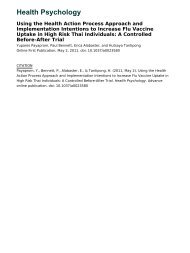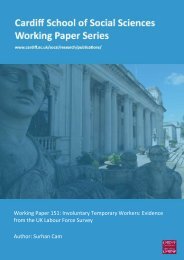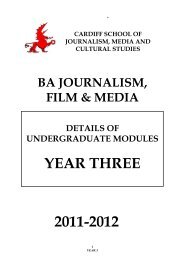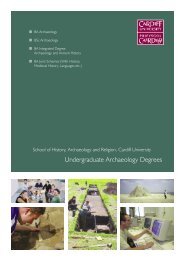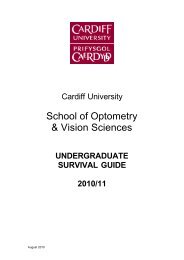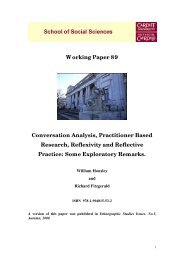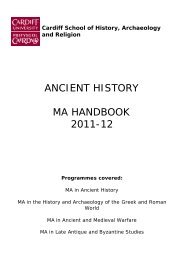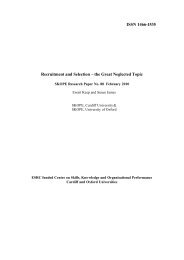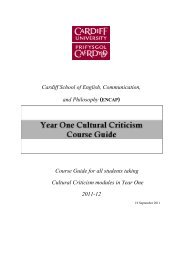Year 3 Catalogue 2011-2012 - Cardiff University
Year 3 Catalogue 2011-2012 - Cardiff University
Year 3 Catalogue 2011-2012 - Cardiff University
You also want an ePaper? Increase the reach of your titles
YUMPU automatically turns print PDFs into web optimized ePapers that Google loves.
MODULE Dissertation CODE: SI0131 SEMESTER(S) Both<br />
TITLE:<br />
MODULE Dr Chris Taylor CREDITS: 40 LEVEL: 3<br />
LEADER:<br />
CONTACT DETAILS Room 2.08 TEL: 02920876938 E-MAIL: TaylorCM@<strong>Cardiff</strong>.ac.uk<br />
MODULE AIM(S)<br />
To provide advanced level social research methods<br />
training; To enable students to design, carry out and<br />
report an extended investigation; To provide academic<br />
supervision for students undertaking independent<br />
study; To develop skills, confidence and abilities in oral<br />
and written communication; To provide a forum for<br />
student peer support and review.<br />
On completion of the module a typical student will<br />
be able to:<br />
KNOWLEDGE AND COMPREHENSION<br />
• Demonstrate awareness of some of the theoretical<br />
and methodological principles that guide the<br />
application of a particular research method (or set<br />
of methods) in a specific research context.<br />
• State the research strategy used in their chosen<br />
project (to include research design and the<br />
formulation of research questions, data collection<br />
and data analysis).<br />
• Show some awareness of the ethical guidelines<br />
appropriate to their discipline and research setting.<br />
• Demonstrate some awareness of the conventions<br />
governing the presentation of research data in a<br />
social science context.<br />
SKILLS (APPLICATION AND ANALYSIS)<br />
• Demonstrate skills of listening, participating,<br />
chairing and learning in research forums.<br />
• Give oral presentations of dissertation ideas,<br />
methods, results and work in progress.<br />
• Use word-processing and other software to write<br />
up research for an academic audience.<br />
UNDERSTANDING (SYNTHESIS AND EVALUATION)<br />
• Identify and summarize literature and comparative<br />
studies relevant to their research project.<br />
• Collect, present and interpret social science data.<br />
• Show awareness of the ways in which their own<br />
research ideas fit into an appropriate disciplinary<br />
and methodological context.<br />
TRANSFERABLE SKILLS<br />
The module will contribute to the development of the<br />
following transferable skills: report writing; oral<br />
presentations, time management, analysing qualitative<br />
and quantitative data; using word processor and<br />
software for qualitative (NVivo) and quantitative (SPSS)<br />
data analyses as well as presentation (Excel and<br />
PowerPoint); and retrieving secondary data surveys<br />
(qualitative and quantitative) from the Data Archive<br />
SYNOPSIS OF MODULE CONTENT<br />
The module will include the following elements:<br />
Advanced Research Methods Training: research<br />
design, data collection and storage, techniques of<br />
analysis, writing and representing , identification and<br />
use of secondary data.<br />
The Research Process: organizing and managing<br />
research, access and ethics, research diaries, research<br />
roles and relationships.<br />
Presenting Research: writing styles and writing<br />
strategies, undertaking literature reviews, oral<br />
presentations, writing a methods chapter, presenting<br />
research findings, producing a dissertation.<br />
Students will work independently on their dissertation,<br />
with appropriate supervision, and will have the<br />
opportunities to critically discuss their work at regular<br />
intervals. Students will also be required to undertake an<br />
oral presentation of their work as part of the module.<br />
METHODS OF LEARNING AND TEACHING<br />
This module will be taught by a mixture of lectures,<br />
surgeries, small-group activities, method workshops<br />
and self-directed learning. Each student will have a<br />
dissertation supervisor<br />
OPPORTUNITIES FOR FORMATIVE ASSESSMENT<br />
Students are expected to submit draft material to<br />
supervisors. This will provide an opportunity for<br />
formative assessment. Research workshops and oral<br />
presentations also provide the opportunity for the<br />
discussion of ideas in a critical and constructive way.<br />
ARRANGEMENTS FOR FEEDBACK ON WORK<br />
Students will receive regular oral and written feedback<br />
from dissertation supervisors. Oral feedback will be<br />
given on oral presentations<br />
METHOD(S) AND WEIGHTING OF SUMMATIVE<br />
ASSESSMENT<br />
Presentation 20% (15 minutes) (Spring)<br />
Dissertation 80% 10,000 – 12,000 words (Spring)<br />
INDICATIVE READING<br />
Bell, J. (1991) Doing Your Research Project (3 rd Edition)<br />
Buckingham: Open <strong>University</strong> Press<br />
Berry, R. (1995) The Research Project: How to Write it<br />
London: Routledge<br />
Blaxter. L., Hughes, C. and Tight, M. (2001) How to Research<br />
(2 nd Edition) Buckingham: Open <strong>University</strong> Press<br />
Bryman, A (2004) Social Research Methods, Second Edition,<br />
Oxford <strong>University</strong> Press<br />
Denscombe, M. (1998) The Good Research Guide<br />
Buckingham: Open <strong>University</strong> Press<br />
Denscombe, M. (2002) Ground Rules For Good Research<br />
Buckingham: Open <strong>University</strong> Press.<br />
Devine, F. and Heath, S. (1999) Sociological Research<br />
Methods in Context London: Macmillan<br />
Gilbert, N. (2001) (Ed) Researching Social Life (2 nd Edition).<br />
London: Sage<br />
Hayes, N (2000) Doing Psychological Research Buckingham:<br />
Open <strong>University</strong> Press<br />
OTHER INFORMATION:<br />
This 40-credit module will provide final year students with<br />
advanced research methods training and dissertation<br />
supervision. It will give guidance on research design, the<br />
research process, and the practical application of one or more<br />
methods. Students will be required to undertake an empirical<br />
piece of work, and to present their research in oral and written<br />
form. Students will produce an 8 – 10,000 word dissertation.<br />
The module is compulsory for those students wishing to gain<br />
BPS recognition for their undergraduate degree. It is also<br />
particularly suitable for those students wishing to develop their<br />
research skills, to investigate a substantive topic area, or to<br />
pursue postgraduate study in the future. It is recommended<br />
that students pursuing this module will have completed a level<br />
2 module in social science research methods.<br />
14



